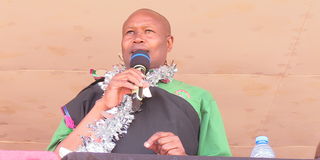Premium
Why Knut wants sabbatical and elections leave for teachers

KNUT first vice National Chairperson Joseph Malel Langa’t at a past event.
The Kenya National Union of Teachers (Knut) is lobbying the Teachers Service Commission (TSC) to grant teachers sabbatical leave for academic research and for those contesting elective positions in the General Election.
The trade union’s first National Vice Chairman Malel Langat said the move is to ensure teachers do not lose their jobs or benefits while pursuing professional development or political ambitions.
“Teachers should not be penalised and made to lose their jobs when they seek elective positions. Like those in the private sector, they should be allowed to take leave and return to work if they fail to secure the positions,” he said.
The need for sabbatical leave stems from the challenges teachers face when conducting research for their academic work.
Many teachers, including published authors whose works are used as set books, struggle to balance their teaching duties with their academic pursuits due to limited study leave.
Typically, teachers seeking higher education abroad often have to resign from their positions.
“Some teachers are published authors, and their work is used in schools. They should be accorded leave to conduct research without the fear of losing their jobs,” Mr Langat said.
Currently, teachers in Kenya are entitled to various types of leave including 120 days of maternity leave, 21 days of paternity leave, 45 days for pre-adoption, and six months of sick leave, with the first 30 days in full pay, the next 30 days half pay and the rest days unpaid leave.
Special leave
The teachers are also given special leave if they are traveling out of the country on assignments like sports, study leave and leave of absence for those joining trade unions after being elected to various positions.
However, study leave is often perceived as it is only available to graduate teachers seeking post-graduate studies in specific areas of study, according to the TSC Code of Regulation.
P1 teachers holding Diploma certificates are not permitted to upgrade their qualifications through this leave.
Mr Langat said it was not a crime for one to be ambitious in life and seek to change careers, and that they should not be condemned when such ambitions are not realized.
Mr Langat was speaking in Bomet on Tuesday in the company of National Executive Council (NEC) member and Bureti branch executive secretary Alfred Rop, branch executive secretaries – Desmond Langat (Bomet), Ann Cheruiyot (Kericho), Willy Korir (Transmara), David Bore (Kipkelion) and Mathias Langat (Sotik).
At the advent of devolution, teachers interested in joining county governments were granted leave. However, this policy was scrapped after many teachers transferred their services to devolved units.
As part of the 2025-2029 Collective Bargaining Agreement (CBA), Knut is also seeking to extend sick leave from six to 12 months with full pay.
The current CBA, which runs from 2021 to 2024, is set to expire at the end of this year, and the TSC has opened negotiations with trade unions that are expected to conclude by December.
TSC Chief Executive Office Nancy Macharia expressed optimism about commencing negotiations on the CBA.
“The negotiation, signing, reviewing and implementation of the 2021-2025 CBA in the teaching service which ensured that the teachers welfare is not only implemented but also reduced into a binding agreement that the government has continued to implement to August 1, 2024,” Dr Macharia said in Nakuru.
Dr Macharia said the commission was required by the Labour Laws in the county to enter into discussion with the unions on the issues relating to the improvement of the welfare of teachers.
Education Cabinet Secretary (CS) Julius Mgosi Ogambo said the government was committed to creating a conducive environment for teachers to impart knowledge on learners so as to create a solid and dependable human resource.
“We have no choice as a government but to commit ourselves to provide qualified, highly motivated and well-supported teachers to every public school if we are to achieve quality in learning,” Mr Ogambo said during the World Teachers Day in Nakuru.
Mr Ogambo said the government will redouble efforts to engage with teachers and their organizations and devise congregate policy measures and strategies to provide appropriate incentives including competitive remunerations and clear career path progression.
“The government would ensure Empowered through provision of decent working conditions, well resourced, provided with clear path for professional development, safe and healthy working environment,” Mr Ogambo said.





